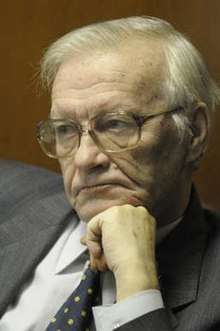Leonid Borodin
Leonid Ivanovich Borodin (Russian: Леони́д Ива́нович Бороди́н; 14 April 1938, in Irkutsk – 24 November 2011, in Moscow) was a Russian novelist and journalist.[1]
Leonid Ivanovich Borodin | |
|---|---|
 | |
| Native name | Леонид Иванович Бородин |
| Born | April 14, 1938 Irkutsk |
| Died | November 24, 2011 (aged 73) Moscow |
| Occupation | writer, poet, member of All-Russian Social-Christian Union for the Liberation of the People, Civic Chamber of the Russian Federation |
| Citizenship | |
| Alma mater | Irkutsk State University, Buryat State University |
| Notable awards | Solzhenitsyn Prize, Yasnaya Polyana Literary Award |
Biography
Born in Irkutsk, Borodin was a Russian Orthodox Christian and a Soviet dissident. In the 1960s he belonged to the anti-Communist All-Russian Social-Christian Union for the Liberation of the People (VSHSON).[2] He was arrested and imprisoned in the 'strict regime' Camp 17 in 1967, and went on hunger strike there with Yuli Daniel and Aleksandr Ginzburg in 1969.
After his release in 1973, Borodin’s works were smuggled out of the Soviet Union. The publication of an English translation of The Story of a Strange Time led to his arrest in 1982 on charges of 'anti-Soviet propaganda'. He was sentenced to 10 years of hard labour in Perm-36 Maximum Security Camp (ITK-6), as well as five years' internal exile.[3] Released after four years, in the perestroika era, Borodin was allowed to visit the West with his wife.
Borodin was the subject and first-person narrator of the 2001 film Leonid Borodin: Looking through the Years.[4][5]
A winner of many literary prizes, including the 2002 Solzhenitsyn Prize, Borodin was editor-in-chief of Moskva, a popular literary magazine.[6] In 2005 he was appointed to the first convocation of the Public Chamber of Russia.
Works in English translation
- Partings, The Harvill Press, 1988.
- The Year of Miracle and Grief, Quartet Books, 1988.
- The Third Truth, Harpercollins, 1992.
- The Story of a Strange Time, Harpercollins, 1993.
References
- @openspace_ru. "Умер Леонид Бородин — Литература —". Openspace.ru. Archived from the original on 2011-11-27. Retrieved 2011-11-25.
- Reference guide to Russian literature, Neil Cornwell, Nicole Christian, Taylor & Francis, 1998, p. 185
- "Gulag: Soviet Forced Labor Camps and the Struggle for Freedom". Gulaghistory.org. Retrieved 2011-11-25.
- Leonid Borodin: Looking through the Years. Dir. Viacheslav Novikov. Sacramento, Calif.: Artistic License, 2001.
- Nepomnyashchy, Catharine Theimer (2002). "Review: [untitled]". Slavic Review. 61 (4): 815–816. ISSN 0037-6779. JSTOR 3090391.
- "In Time of Troubles One Should Stake on the Idea. Interview with the writer Leonid Borodin". Pravoslavie.ru. 2002-04-24. Archived from the original on 2016-03-03. Retrieved 2011-11-25.